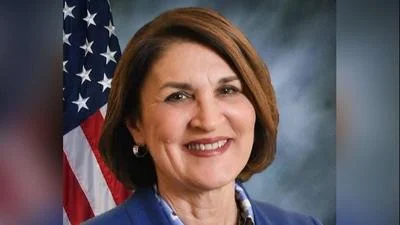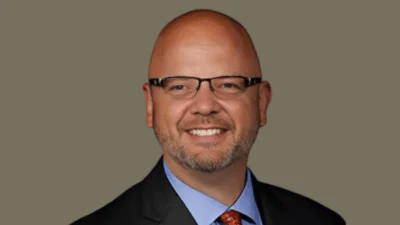U.S. Supreme Court
U.S. Supreme Court
An Illinois case against the state's largest private-sector employee union that was recently appealed to the U.S. Supreme Court could bring sweeping change to the entire nation, the president of an organization backing the plaintiffs said on a recent radio talk show.
"Public-sector employees will have right-to-work across the country, and the unions will be weakened," Liberty Justice Center President Pat Hughes said on "Illinois Rising. "They'll be weakened because there will be less money coming into their coffers to do the politics that they do and the influence of public officials."
Naturally, the unions are fighting the case, Hughes said, "because the amount of money that they are extorting out of these nonunion employees is meaningful to them as they try to buy the leverage from public officials."

Liberty Justice Center President Pat Hughes
Hughes, a Hinsdale attorney and real estate developer, also is co-founder of the Illinois Opportunity Project and co-hosts "Illinois Rising" with Dan Proft, a principal of Local Government Information Services, which owns this publication.
The Illinois case, Janus v. American Federation of State, County and Municipal Employees (AFSCME), questions whether public employees should be required to pay dues and other fees to public employee unions. It was filed by state workers Mark Janus and Brian Trygg, who say they don't want to be required to pay those dues and fees. The U.S. Seventh Circuit Court of Appeals denied their claim in March.
Janus and Trygg, who have been represented by attorneys provided by the Liberty Justice Center and the National Right to Work Legal Defense Foundation, appealed their case to the U.S. Supreme Court, filing their writ of certiorari on June 6.
"There is an outstanding chance that if the court grants cert -- and my prediction is that they will -- that there are five votes on the court to end forced unionization of public sector workers," Hughes said.
The latest developments in the case come a year after the high court handed down a 4-4 split decision in Friedrichs v. California Teachers Association, in which justices considered "agency shop" agreements -- contracts that give unions exclusive rights to represent categories of workers and require those workers to pay dues. The question before the Supreme Court was whether agency shop agreements were invalidated by the First Amendment and if it also is a First Amendment violation to require public employees to affirmatively opt out of subsidizing nonchargeable speech instead of providing affirmative consent.
With their split decision in that case, on March 29, 2016, the justices issued a single-sentence ruling affirming the prior ruling by the U.S. Ninth Circuit Court of Appeals that indicated the answer to both questions was "no."
The split decision was made possible in that case after the death of Justice Antonin Scalia the previous month, leaving only four justices on the high court rather than the almost tie-proof nine. Had Scalia lived to participate in the decision, things would have been different, Hughes said.
"The court indicated -- particularly Justice Scalia before he died -- that it was a violation of First Amendment rights of free speech and free association to force these nonunion members to pay these fair-share dues," Hughes said. "Scalia also indicated, and so did Justice [John] Roberts, that everything a union does is political; everything a public sector union does is political because in the collective bargaining process, you are bargaining with a government. So it's like lobbying."
Court observers have been referring to Janus vs. AFSCME as "the new Friedrichs case" in which newly seated Justice Neil Gorsuch could swing the court in the opposite direction -- good news for public employees opposed to being forced to pay unions but bad news for unions themselves, Hughes said.
"They know that their system is crumbling," Hughes said. "And these people, like Janus and others, who are willing to do this, they're under tremendous pressure at work. Pressure from other union members -- you know how unions are. So Janus is doing a great service for the United States, and I hope the Supreme Court goes the way that we think it will."





 Alerts Sign-up
Alerts Sign-up